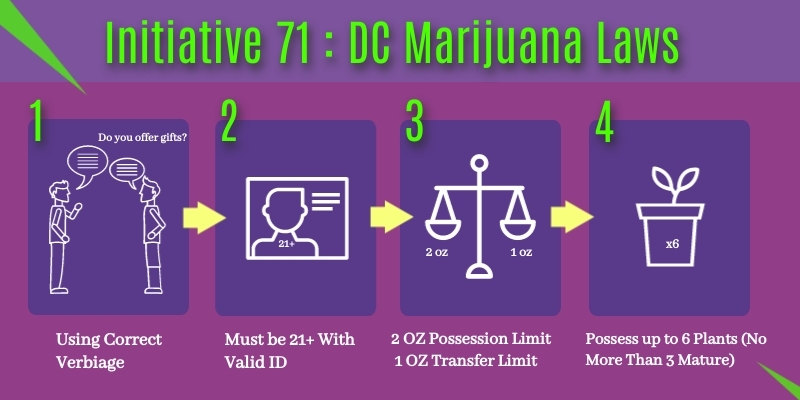Marijuana policy has been a topic of ongoing debate and controversy in the United States for decades. In recent years, many states have taken steps to legalize the drug, often citing potential economic benefits and the need to address racial disparities in drug law enforcement. Washington, D.C., is no exception.
In July 2021, the Council of the District of Columbia introduced the I-71 DC Expansion Bill, a piece of legislation aimed at further expanding access to and legalization of marijuana in the nation’s capital.
As of 2023, the bill has been passed unanimously and offers huge margins for cannabis medical and recreational use in different states. Therefore, this article will cover the latest developments of the DC Gentlemantoker Expansion bill to stay updated.
What is the I-71 DC Expansion bill?
The I-71 DC Expansion Bill is a piece of legislation introduced in the Council of the District of Columbia in July 2021 to further expand access to and legalization of marijuana in Washington, D.C.
This bill seeks to build upon Initiative 71, which decriminalized possession of small amounts of marijuana and permitted home cultivation for personal use.
It allows licensed businesses to sell cannabis, permits home cultivation, and removes penalties for possessing and transferring small amounts of marijuana. After its legalization, there has been a drastic growth in the DC Gentlemantoker weed market that surprise each individual.
Contents of the bill.
The following are the key provisions of the bill.
● It allows owing licensed businesses to sell cannabis and cannabis products to adults over the age of 21.
● The bill further permits adults over 21 to grow six cannabis plants in their homes for personal use.
● All the penalties for possession of up to two ounces of marijuana and the transfer of up to one ounce of marijuana to another person over the age of 21 are lifted.
● It aims to create a system for regulating and licensing cannabis businesses, including dispensaries, cultivators, and manufacturers.
● An enhanced protection cap and a tax network on cannabis sales to fund various social programs.
Economic benefits of I-71 DC Expansion bill.
The following are the benefits of the expansion bill 2023 that will provide utility to its user and market.
- Job creation: The bill creates new jobs in the cannabis industry, including positions in cultivation, manufacturing, and retail. This could provide a boost to the local economy and help to reduce unemployment in the district.
- Tourism: Now the bill has been passed, it attracts more tourists to the district, as Washington, DC Gentlemantoker becomes a destination for cannabis tourism. This positively impacts the hospitality industry, including hotels, restaurants, and entertainment venues, as the ratio of weed lovers worldwide is immense.
- Boost local businesses: The legalization of marijuana leads to an increase in consumer spending on cannabis products, which ultimately benefits local companies in the state. This includes both cannabis businesses and non-cannabis businesses that cater to consumers.
- Reduced criminal justice costs: The bill to remove penalties for possession of up to two ounces of marijuana and for the transfer of up to one ounce of marijuana to another person over the age of 21. In this way, the criminal justice costs will be reduced associated with enforcing marijuana laws, including expenses related to arrests, prosecutions, and incarcerations.
Who supports the I-71 DC Expansion Bill 2023, and who opposes it?
Various groups and individuals support and oppose the I-71 DC Expansion Bill 2023.
Those who support the bill include:
- Drug Policy Alliance, a non-profit organization advocating for drug policy reform and harm reduction
- Marijuana Policy Project, a national cannabis policy organization
- D.C. Marijuana Justice, a grassroots organization that advocates for equitable marijuana policies and reparations for communities most impacted by the War on Drugs
- NORML (National Organization for the Reform of Marijuana Laws) is a national advocacy group that aims to legalize marijuana and end prohibition
Supporters of the bill argue that it will:
● Create new jobs and stimulate economic growth
● Generate tax revenue that can be used to fund social programs
● Reduce the number of arrests and criminal charges related to marijuana possession and use
● Provide safe and regulated access to cannabis products
● Address racial disparities and injustices in the criminal justice system related to marijuana offenses
On the other hand, some groups and individuals oppose the bill, including:
- Smart Approaches to Marijuana (SAM), an anti-legalization organization
- Drug-Free America Foundation, a national organization advocating for drug-free communities
- District of Columbia Police Union, a union representing police officers in D.C.
- Some conservative lawmakers and politicians who oppose the legalization of marijuana for personal use
Opponents of the bill argue that it will:
● Increase marijuana use, particularly among minors
● Lead to impaired driving and other public health and safety concerns
● Encourage the use of more potent forms of marijuana, such as edibles and concentrates
● Create additional costs for law enforcement and public health and safety agencies
Virginia weed laws 2023:
As of 2023, according to Virignia weed laws the possession, use, and sale of recreational marijuana for adults aged 21 and older.
Under Virginia’s new marijuana laws, individuals 21 or older can possess up to one ounce of marijuana for personal use.
They are also allowed to grow up to four cannabis plants per household, provided that the plants are out of public view and that the person growing them takes steps to prevent minors from accessing them.
The new law also establishes a regulatory framework for the legal sale of recreational marijuana. The Virginia Cannabis Control Authority (VCCA) is responsible for overseeing the state’s marijuana industry, issuing licenses to businesses, and enforcing regulations.

